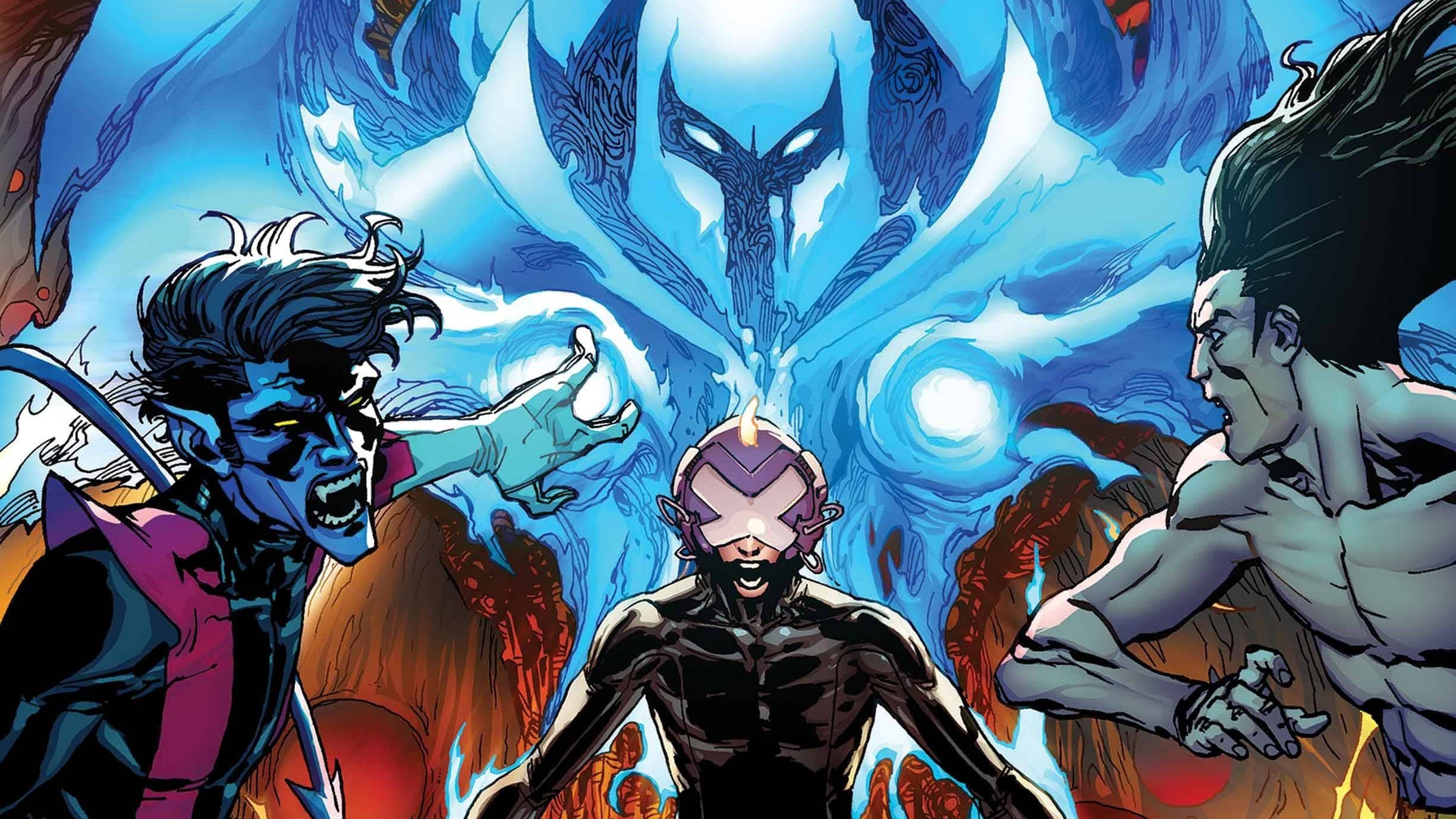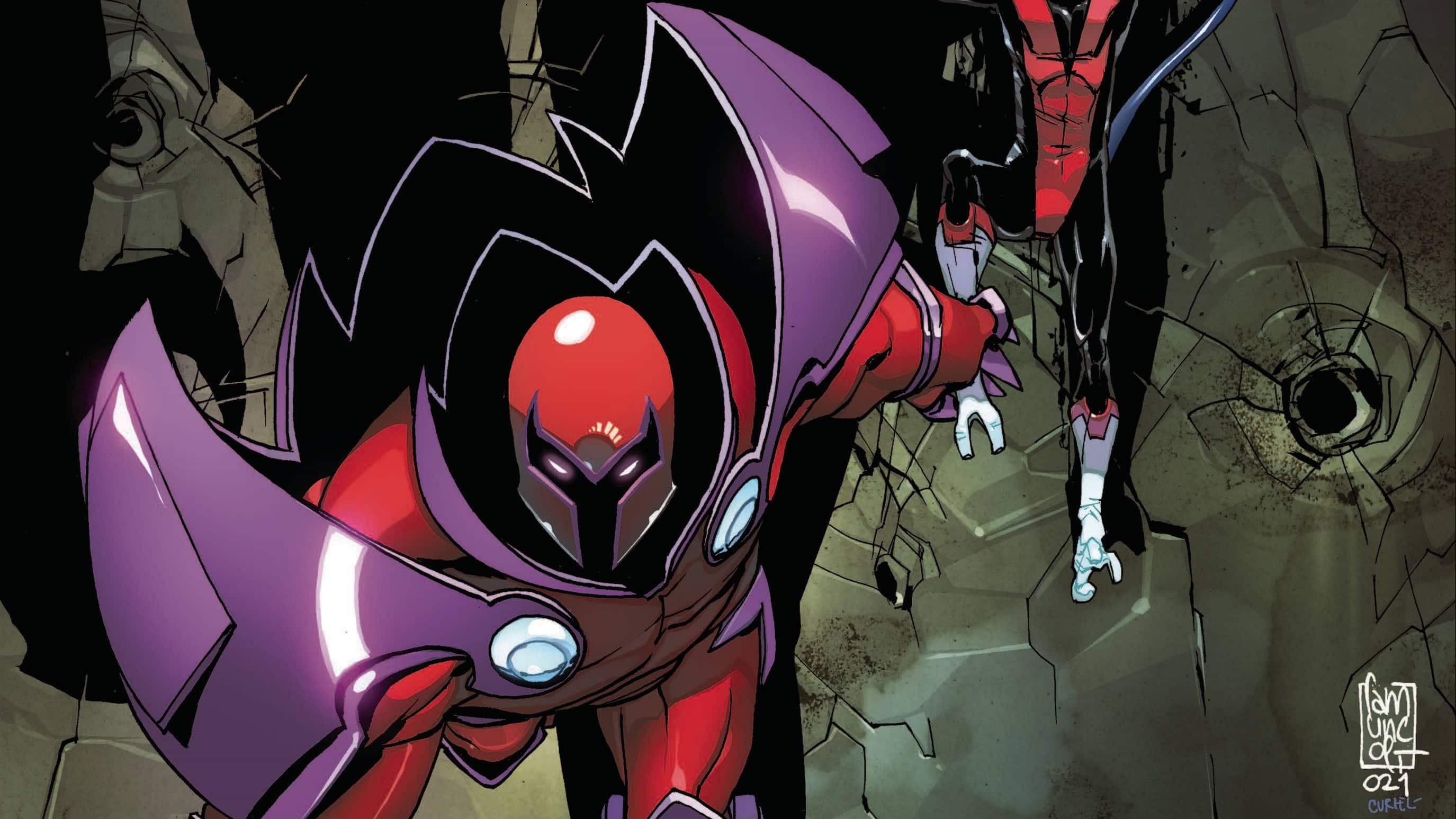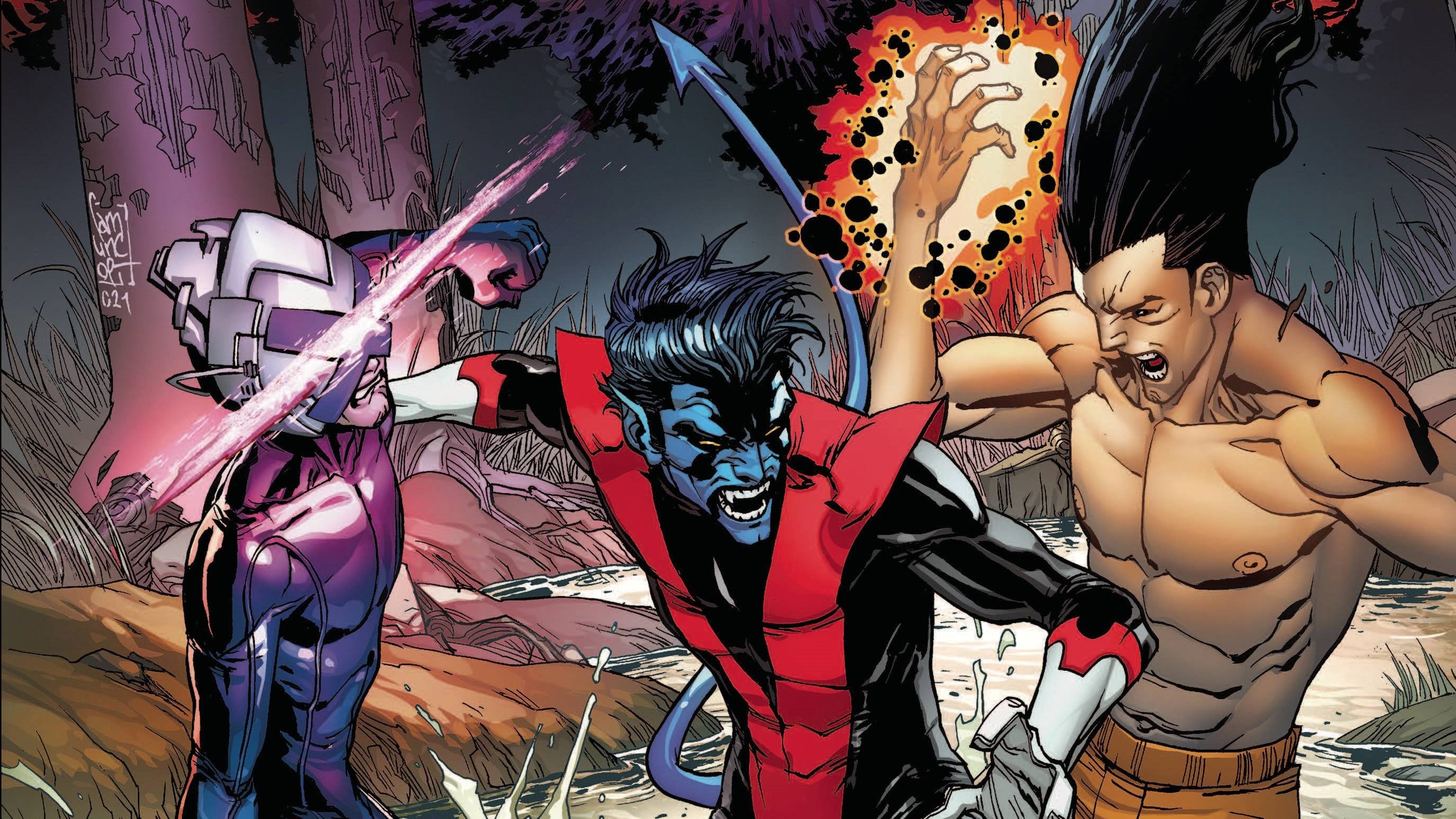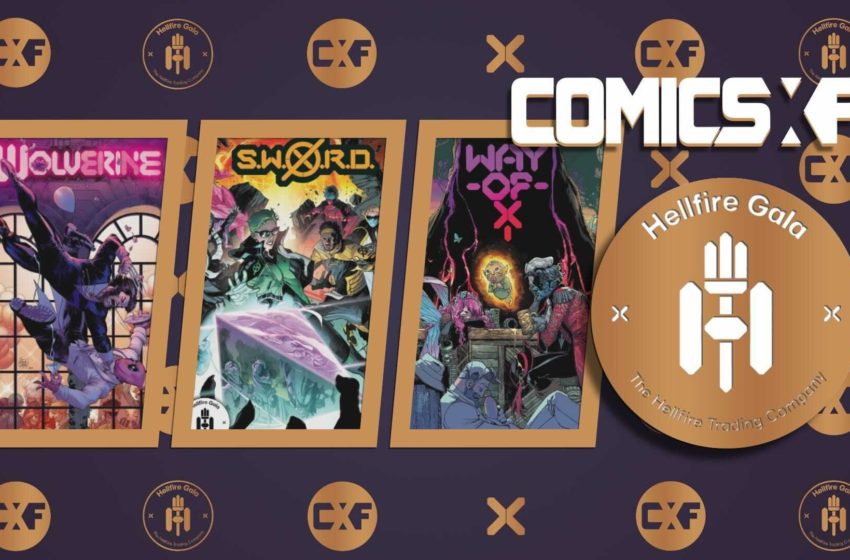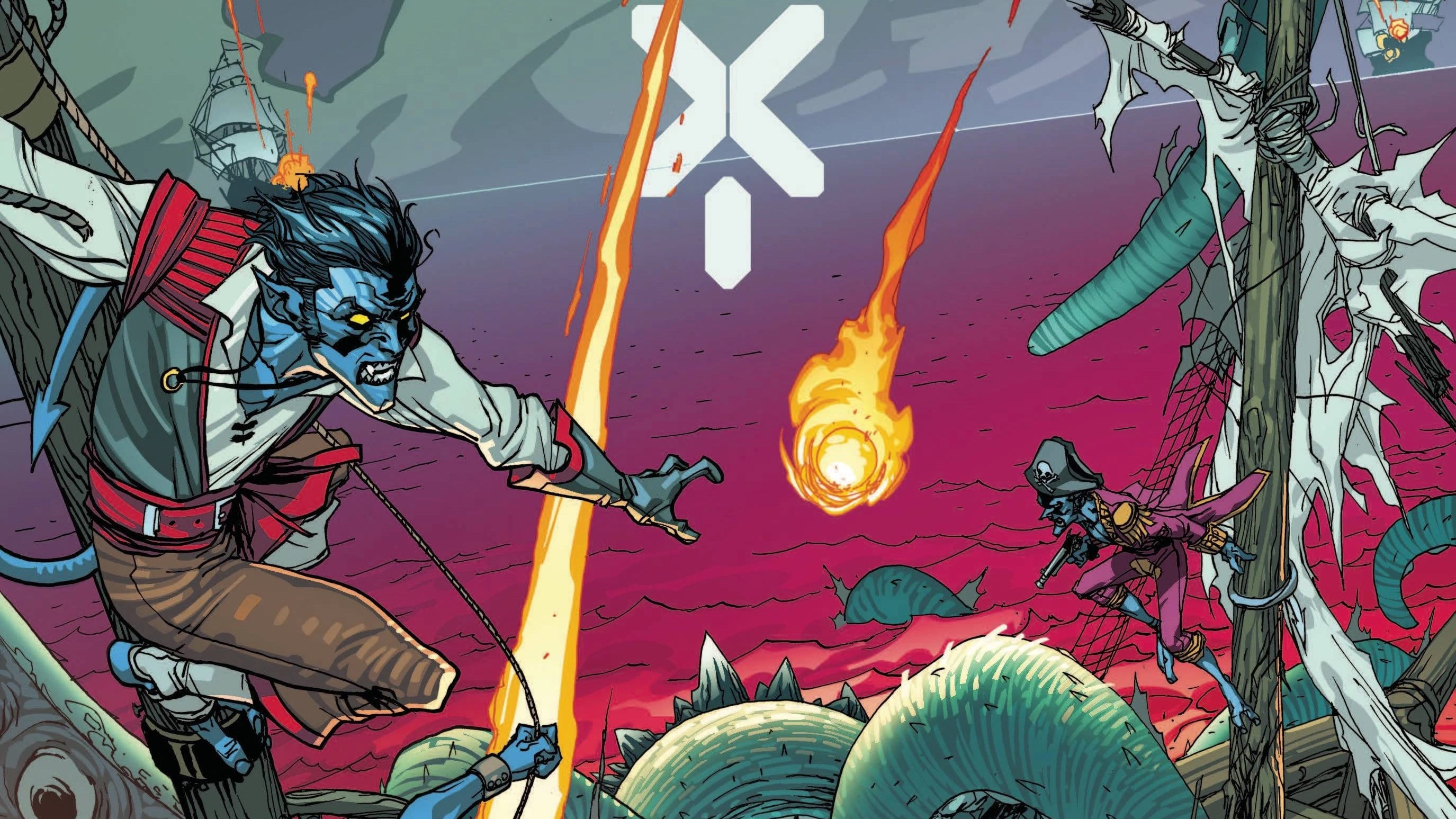Onslaught has crept into the hearts and minds of the mutants on Krakoa. That’s not good for anyone. Si Suprrier, Bob Quinn, Java Tartaglia and Clayton Cowles show us the way in X-Men: Onslaught Revelation #1.
Anna: Just when you thought it was over, we’re back for one more round with a comic that isn’t Way of X but is actually more Way of X. If you’ve read our previous columns, you’ll know I wasn’t clamoring for more, but when you pitch yourself to ComicsXF as a Nightcrawler expert to review the current Nightcrawler comic, you are contractually obligated to finish the job. Wait – I’m being informed that we don’t have contracts? [Ed. note: I could not have been more clear about this.] And that I chose to be here of my own accord? Hm, better have my lawyer look into it. While I’m on hold, I guess we could talk about this comic?
Jude: Have your people call my people, Anna. In any case, expectation is the thief of joy, and I had pretty high expectations for Way of X that were never met; in fact, those expectations were often subverted and turned into laments. Still, while I did not particularly enjoy Way of X, I wonder if, with shifted (i.e. lowered) expectations, I would have. I wonder if we didn’t know as much – if we didn’t have such high (or basic, depending on your point of view) expectations – if we might have enjoyed this book more.
Thus with this review, I tried my best to temper my expectations; I tried to look at this through the eyes of a reader untethered to the history of it’s main character. I shouldn’t have to deny who I am and what I know to appreciate a book, but I’m not just reviewing for me; I’m reviewing for people who don’t share my knowledge base and worldview, too. So for them, I did my best.
For them, here we are.
And you know what, here is pretty darn ok. This was a well-told story, a story so thorough and self-contained that I wonder if we really needed Way of X. Maybe truncating some of the details – the details we found disorientating, disrespectful, and disconnected from character histories and actions – would have made the work better. Less, as they say, is more.
But we have what we have, and what we have is about as good and fitting of an end to a series as we could hope for.
Anna: Part of me is so happy about this comic book. But there’s another part of me that feels the way I did the time my friends pretended to forget my birthday to throw me a surprise party. By the time the party happened, I had experienced so much anger, hurt, and angst, it took me several hours and beverages to recalibrate enough to enjoy it, and the whole experience left me with a lot of new insecurities. The point is – don’t throw me a surprise party. But also – this comic book feels like an abrupt about-face, in ways that are both good and slightly disorienting. Let’s get into it.
A Wonderful Idea

Jude: We begin with an ecclesiastically-tinged narration of where we are: Onslaught has rooted himself in the minds of every resurrected mutant, feeding off missing memories, powering himself with their aggression, guiding these mutants, including Xavier and Magneto, towards an Ochris-orchestrated doom. This doom is called the Cruciball, an event designed to kill as many mutants as possible, in as violent a way possible in order to power Onslaught into virtual Godhood. And as Xavier, under the subconscious direction of Onslaught, eliminated all of the mutant mind backups, these deaths would not only be violent; they would be permanent. I like the idea that actions, including death, have consequences (maybe the overarching theme of this work), and I appreciated the idea that the downfall of the mutants would obviously, eventually, come from within. That’s how it works in the real world, after all – decimation is almost always an inside job.
Legion, guarded (from himself) by Z/Xorn(s) (lol), utilizes his vast reality warping powers to create a pocket universe, accessible via a Krakoan gate in his mind (Lol), to create a “non-euclidian psychic habitat” (LOL). This is where Kurt takes Pixie as he kidnaps her from the ball. Legion uses his powers to literally exorcise the demon out of her mind. This is silly and batshit in the best of ways, and I very much like it. The creative use of powers, both of Legion and Krakoa; the overtly religious allusions that make sense, contextually; and again, the use of narration which gives a biblical, third person witness-to-the-action feel – this is all done well.
We also see Kurt brought Lost and Cortez to Legion’s mindspace before they came under the control of the Onslaught-compromised masses. Apparently, Cortez was able to psychically pass on the message to Kurt before he went into a coma. This revelation feels forced – all the implications at the end of Way of X #5 led me to believe that getting the inspiration from Cortez would involve more than, well, this. But, I guess deus ex machina is appropriate here. In any case, using a mutant circuit (another recurring theme – mutants are more powerful together than apart) composed of Stacy X, Dust (yes, she needs a better name), and (my boy!) the Gorgon, Legion attempted – and succeeded – in showing Cortez the error of his ways.
Kinda.
I’m not a huge fan of narration as exposition, yet I think it works here. The tone and narrative voice feel informative while still engaging the imagination of the reader to fill in gaps. The intro is effective – so effective, in fact, that readers who missed/avoided Way of X can jump right in and feel right at home. Do you agree, Anna?
Anna: I think the narration is mostly effective, though a bit heavy-handed in places, which admittedly is a bit of a necessity to catch-up readers who may have missed WoX. But I would have appreciated a bit more showing instead of telling when it comes to the characterization of this book’s main character. Nightcrawler reads like a completely different person in this comic than he was in WoX. Which, again – I am super happy about! But also – kinda confused about!
Cortez waking up from his coma to remind Kurt of his revelation about “the spark” happens off-panel, between issues. So it’s a bit strange to go straight from the guy Kurt was in WoX #5, who was deeply unhappy and insecure when he wasn’t being puritanical and judgemental, to the confident, expansive guy he is here. Presumably, the intent was to have WoX offer a series of “revelations” informing this transformation. But in practice, we’re missing some important connective tissue.
Then again, I’m pretty okay with hand-waving most of WoX as a dream, and this comic seems to enable – and even encourage? – that, so all of my critiques about how we got here are tempered by gratefulness about getting here.
Jude: Meanwhile, the exorcised Pixie is back at the Cruciball, using her psychic knife to root out Onslaught in her closest allies as they recoil in horror from what could have been and fear what still might be.
I liked the visuals here a lot – the madcap of Legion’s mind, assisted by the powers of the other mutants, is displayed in an engaging way. Colors color moods well, faces are detailed and expressioned (as they need to be to convey sadness and horror), and the scale of the panels conveys the scale of the event. There are a lot of good things here.
A lot of good that comes at the expense of Lost. But more on that later. Anna, your thoughts?
Anna: There’s also a sermon in this section, about fish and sharks and whales (and mutants). As we’ve discussed in previous columns – Kurt is not a priest. But he’s not really being one here, which I appreciated; his astral podium disappears in a hurry, and his devilish, playful smiles throughout this sequence were a joy to behold. Here and in the climactic scene involving the mutant circuit, Kurt’s leading as a trickster, encouraging free-thinking and doing the unexpected. This is a good character read, and exactly why Kurt has always been ill-suited to being a traditional sort of leader, of the secular or religious variety. Those times when Kurt’s been an effective leader, his leadership has been based in upholding the power of individuality; he doesn’t tell people what to do, he empowers them, through his example, to trust their own abilities and instincts. His faith is the trust he places in others. “We rule us,” a line Legion applied to himself in X-Men: Legacy that Kurt repeats and extends to all mutankind in this issue’s climax, either evokes or distills this idea.
Legion’s defining multiplicity extends this idea and gives it substance, in the form of the mindscape temple. Although Legion doesn’t get a lot to do in this issue, he is the inspiration and catalyst for everything. There’s a lot of potential – and risk – involved in making Legion’s mind a center of discovery and healing, but it’s not something that’s fully teased out at this juncture.
Art-wise, Quinn was asked to do a lot throughout this comic, showing multiple planes of existence, mental states, and thematic textures on any given page. I think he lived up to the challenge as well as anyone possibly could. There were times when I wished he’d had a bit more space to operate; the Cruciball and the first full view of Legion’s mindscape temple deserved splash pages, though the Onslaught splash that leads into the title page is a treat. A grisly treat, but a treat nonetheless. That is one heckuva sword!
I also want to praise the evolution of Quinn’s character modelling, with Kurt and Pixie, especially. He clearly put effort into getting Kurt’s hair right in this issue, which might seem inconsequential, but I’d argue Kurt’s curls are actually important to his character, representing him coming back to his true self. I also love Pixie’s dramatic elvin features and, once again, the careful styling of her hair – the braids and kiss curls are perfect. This attention to detail amid the psychic conflagration that comprises most of the issue communicates a ton of love. Quinn has already said he won’t be the artist on the next installment of this series, whatever that looks like. But he’s going out with bang.
The Miseducation of Fabian Cortez

Jude: Cortez comes clean. He never felt powerful or whole. He used his powers to become an additive to those who wielded true power, tempering his pride with the belief that without his help, the powerful would not be, well, powerful. And yet he knows that alone, he is powerless. He knows he has wronged people. He wants love and absolution from others, yes, but mostly from and for himself.
Cortez is a sad, pitiful man, just coming to grasps with how much damage he did simply to assuage his pride. He’s right there, on the cusp of asking for absolution, asking for forgiveness.
Yet he doesn’t, and therein lies the problem.
I believe in reformation, in redemption. But redemption asks that we admit and accept the wrong we’ve done, that we apologize for those wrongs, and that we make amends for those wrongs.
Cortez doesn’t do this; Cortez never says “I’m sorry, I was wrong, will you forgive me?” The implications of his sadness and guilt are not apologies or actions; they are simply feelings of pity. He does not complete any of the emotional labor (beyond this pity) needed for forgiveness. He never admits that he was wrong; he never explicitly says he wronged Lost; he never asks for her forgiveness.
But Lost, while holding Cortez’ hand as he recoils from his own actions, grants him absolution, if not salvation. Lost, the mutant harmed by Cortez, the mutant woman who was painfully experimented on by Ochris, the Black woman who ended up being patient zero of the Onslaught infestation – Lost, the one in the most pain, initiates the actions of forgiveness, even if her words explicitly don’t forgive.
Actions speak louder than words, and these actions are unacceptable, predictable, and unforgivable.
I sought out to – and really, really tried to – divorce these impressions from my experiences and my biases. I can’t. I can’t see a Black woman, yet again having her pain used as magical means for a white man’s redemption – a redemption Cortez can’t even bring himself to ask for. Her sole purpose in this work was to grant absolution. She has to explicitly forgo hate, a hatred that was well earned; he need only wallow in self-pity. There is a point where Kurt, standing next to Lost, explaining what Lost went through at the hands of Orchis, says “who knows what she went through?”
Lost. Lost knows what she went through.
But because she has no agency – because she is invisible unless called upon – her voice isn’t allowed to tell the story of her own mistreatment. In fact, it’s empathy for Fabian’s pain, the literal pain of her prosecutor that quelled the hate in Lost, releasing the hold Onslaught had in her and revealing him, completely, to the masses.
I hate this.
The labor of Black women never ends, even in a comic.
Anna: I made a face while reading the comic when I got to the line about “who knows what she went through?” Guys – she’s standing right there. Don’t talk about her like she’s an idea instead of a person. I understand Lost has been struggling to find her voice through the trauma she’s experienced, and that showing her telling the story at the end of this issue is meant to communicate a degree of empowerment and healing on that score. But between WoX and this comic, there are just so many pages devoted to the development of Fabian Cortez’s very basic self-awareness, at the expense of so many other things we could be doing.
To be as fair as possible – the ability to show compassion for an extremely unsympathetic man can be read as an act of heroism. Yet I’m with you, Jude, on how badly it comes across. I can’t unsee Lost being created, tortured, and manipulated for the purpose of redeeming a fascist and, more generally, making a bunch of men have feelings and then pat themselves on the back for having them. I would be bothered by any character being put in the role Lost is put in here, but the fact she’s a Black woman and a visibly different mutant who resonates with disability makes it worse, for all the reasons you’ve so powerfully articulated.
&^#% The Police

Jude: The hodgepodge mutant circuit of Dazzler, Nemesis et al lead the mutants, including an infected Xavier, to Mars and then to Legion’s mindscape, where the final battle takes place. Dust uses her power to connect everyone physically, introducing them to the idea of the Spark – a connection of hope and love, voiced and directed by Kurt (that’s one hell of a preaching job), replacing the shared hatred that threatened to kill everyone for good.
Now, Lost and Cortez and Stacy and even Gorgon serve in Legion’s psyche, giving refuge and hope and meaning to the mutants.
But apparently, peace must be protected by force – of course it must – so Kurt decides he needs cops – excuse me, Legionaries – to support (enforce?) peace.
Religion and force always, ALWAYS, lead to bad things. The idea that morality needs physical enforcement is disturbing, if not an anathema to what we’ve seen here and in X-Force, and I’d argue, over the history of the X-Men.
This is almost certainly a bad idea. But it gives Juggernaut something to do, so ok?
Anna: I’m doing my very best to withhold judgement about the police-y aspect until I’ve seen more of what this new mission looks like, but I completely understand your informed skepticism. Given the issues I’ve had with what WoX #3 heavily implied about the “Make More Mutants” law, the “We Keep the Law” line in the final page solicit of what comes next made me similarly uncomfortable. I obviously want musketeer Nightcrawler. It is impossible for me not to want that. I am only human. But I thought part of the point of both WoX and this comic was that Krakoa doesn’t need more soldiers? That it’s more in need of stuff like psychological supports and sex education and better birth control and systems of restorative justice? Legion’s mindscape can’t address all of those things. (Or can it? I guess that remains to be seen.)
Maybe this is ultimately just a “limits of superhero comics” thing. Superhero comics always tell their stories about society, culture, and the human (or mutant) condition using real, fantastic, and metaphorical violence. But there are ways of making violence complex and meaningful; arguably, this particular issue succeeds in that respect. I’m not sure how much I’m currently inclined to trust this writer’s ability to consistently find a new way. But I want to believe.
X-Traneous Thoughts

- There were some additional gestures in this issue toward repairing the Loa and Mercury misstep. Because the characters are still mostly off-panel and lack agency, it’s not enough, but at the very least – we are assured they remain attracted to each other rather than caught in the disgust of their parting.
- I wanted more for Gorgon and Stacy, too.
- I guess – assume(?) – there are going to be repercussions from losing the backups of every mutant?
- The name Legionaries, which (of course) is a rift on Legion and a historical thing, also has an unfortunate Catholic allusion too.
- Nightcrawler has a beard again, as well as a new costume with a sweeping coat that evokes either/both swashbuckling or something ecclesiastical. I (Anna) am a beard agnostic who leans toward preferring Kurt sans beard, but know lots of people will be happy, and I support and celebrate their happiness.
- As Legion slyly references Jedi towards the end of the comic, I wonder: in 616, does Disney exist? Lucasfilm? You know what, some questions actually don’t need answers.
- Krakoan Reads: Inferno

